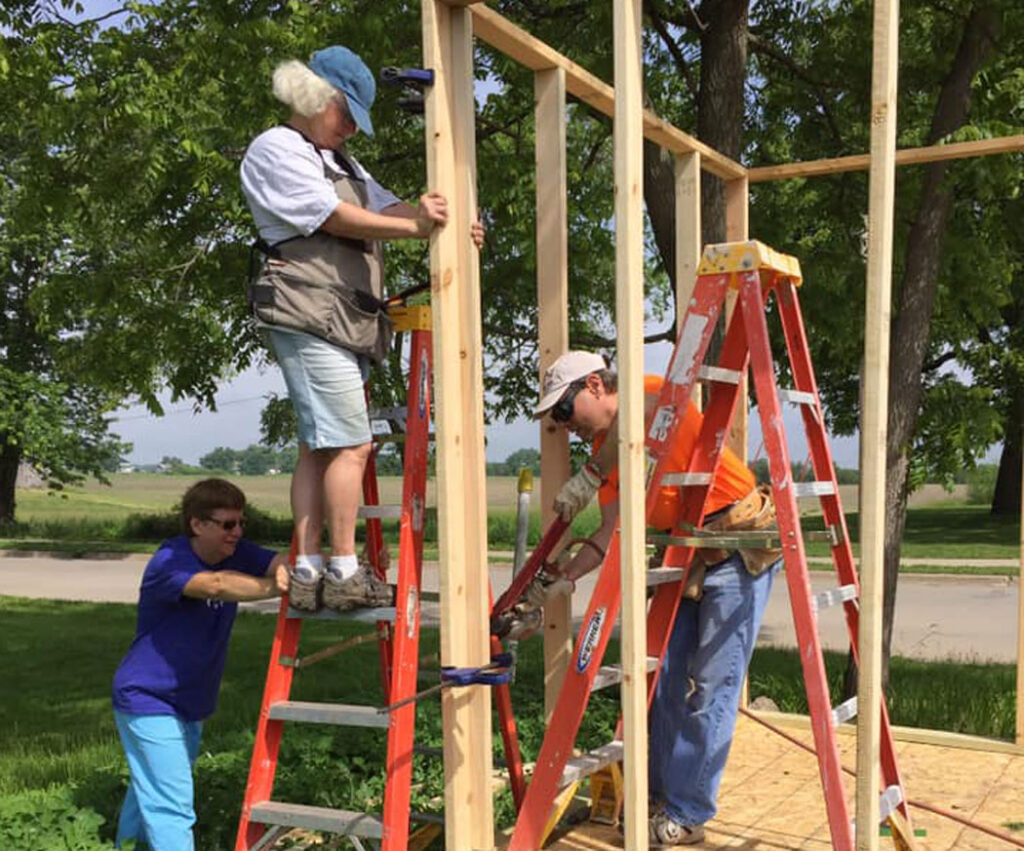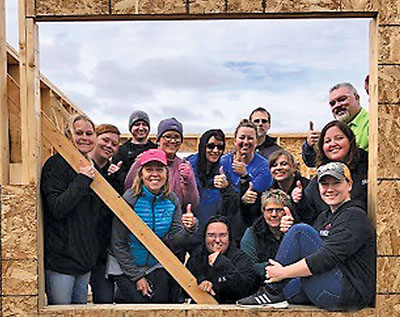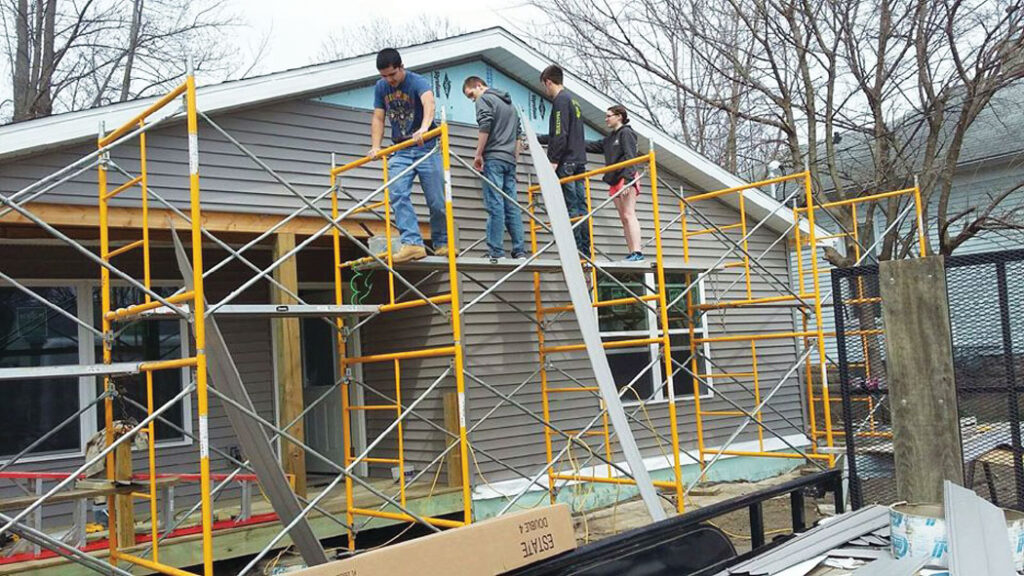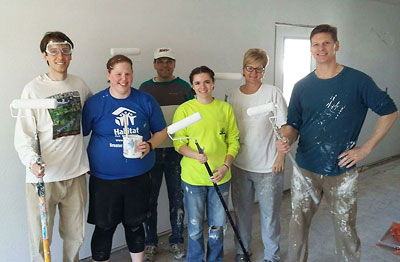
In 1994, John Loin of Partner Construction, LLC, noticed a need for quality affordable housing in Fairfield. Gathering a group of committed people together, he began the rigorous application process to establish a Habitat for Humanity affiliate in town. Eighteen months later, they built their first house on Broadway Avenue, for a single mom with three boys living in substandard conditions.
“The ladies who help with the applications have never worn rose-colored glasses, but they came away from this one with tears in their eyes,” John says. “They couldn’t believe families were living like that.”
The entire family helped with the build. The youngest son, who was five at the time, was so excited to have a room of his own, he pulled John up the stairs one Saturday to show it off. “He’d painted the walls purple,” John says. “He was so proud of it.” The same young man is now an Indian Hills Community College graduate, the first in his family to go to college. “We have a lot of success stories,” John adds.

Habitat for Humanity is an international nonprofit that works to create a world in which everyone has a decent place to live. Started in 1976 in Americus, Georgia, Habitat for Humanity has affiliates in all 50 states and over 70 countries. Habitat has helped build, renovate, and repair over 800,000 houses, providing decent, affordable homes for over 29 million people all over the world.
Families can apply online for help restoring an existing home or building a new one. Families are approved based on their need for affordable housing, their capacity to provide sweat equity, and their ability to pay the mortgage. Sweat equity can include helping with the build, volunteering at a local ReStore, or helping with administrative duties. Once they’ve been approved, families partner with Habitat volunteers to build their house.
“There are no free lunches or free houses,” John explains. “We give a helping hand up, not a handout. I think that’s why it’s been successful.” Deb Johnson, a longtime board member who works as a liaison between Habitat and the families, adds, “I think one thing people need to know about Habitat is we don’t give houses to people—they do have to pay. They have a mortgage; typically, it’s a zero-interest mortgage. Adult homeowners have to put in a minimum of 200 sweat equity hours. And potential homeowners are required to complete some classes in preparation for owning a home.” They also meet with a loan officer to understand what’s involved in a mortgage. Habitat does everything it can to set the families up for success.
The mortgage payments on a Habitat house cycle back into the program, helping to pay for future builds. “These families were chosen to be partners,” John says. “When they fulfill their obligations, they’re helping the next family down the line.” The families’ mortgages pay one-third of the costs of future homes. The ReStore pays the second third, and board members raise the final third.
The Fairfield ReStore, managed by Shanaz Kreider, offers a wide variety of quality donated home improvement supplies, including building materials, furniture, home decor, and DIY supplies. After covering operating expenses, all of its profits support the mission of building affordable homes for people in need.
What It Takes
A build depends on volunteers from all over the community. Contractors help hang doors and install cabinetry, sinks, and countertops. The subcontractors, who install the foundation, electricity, plumbing, and HVAC, frequently work at a discount to help Habitat. One Saturday a month, volunteers are scheduled to work on a build. Corporate groups come annually to help, as do clubs such as Young Professionals of Fairfield and Fairfield Leadership.

A few years ago, Fairfield’s Habitat started working with Fairfield High School. “This current house is the fourth one we’ve been building with the Construction Tech program at FHS, so kids are building most of the house,” Deb says.
The first partner build with high school students was in 2016–2017. “There were seven boys and one girl in that class,” says liaison Kathleen Brown, who has worked on over a dozen houses with community volunteers and students. “They were great, hardworking, serious about the job, and they loved their work.” She adds that students have enjoyed getting hands-on experience in home construction and always do quality work. Many of them go on to have careers in building and trades.

Current social distancing policies have restricted the students’ ability to help, but hopefully, they will be able to return to finish sheetrock, painting, floors, doors, and trim. Students have to complete every aspect of building to get credit. The latest house is slated to be finished in early summer.
“Although it is a different experience each time, it is the pride that owners and builders feel that is the commonality,” Kathleen says. “Our houses are simple and decent, but we hire managers to maintain quality control so these homes will last a long time.”
This year’s larger group of 10 students allows them to choose interior or exterior work. In addition to the hands-on experience of building every aspect of a house, students receive high school graduation credits and Indian Hills credits. “We all work together to build each home,” Kathleen says. “It is an amazing feat each year and we are understandably proud of what we do to help our community.”
Donations Are Always Needed
Despite their impressive record in building so many homes, Fairfield’s Habitat must constantly raise funds to keep going. “It’s tough to operate a Habitat affiliate in a town our size,” says Amber McDowell, now in her second year as Habitat treasurer. “In fact, towns with populations less than 20,000 aren’t even allowed to start an affiliate anymore. The ReStore helps out tremendously, but due to limited resources—not only financial but human resources—we have no executive director, which would cost us at least $35,000, even on a part-time basis.
“Each year is a little bit different, but on average, it costs us around $115,000 to build the home. Mortgage payments from previous builds, income from the ReStore, and other fundraising efforts cover part of that cost. But we are short by nearly $80,000 per year. We are incredibly grateful for any financial support folks are willing and able to provide.”
To maintain their affiliate status, they must build one house a year. Amber is working on a capital fundraising campaign, asking larger employers, banks, and donors to agree to a five-year repetitive donation. The popular ReStore, established in 2010, helps generate funds to supplement the mortgage payments, but with rising costs, Habitat always appreciates financial support, as well as donations of labor and building supplies such as countertops, flooring, and appliances. “People can always donate to us via our website, FairfieldHabitat.org.”
Habitat is also in need of board members and committee members. Contact the ReStore at (641) 209-9450, or message Habitat through Facebook. “It’s a great organization to serve on,” Amber says.
The ReStore is open Wednesday through Saturday, 10 a.m. to 5 p.m. and is located at 1903 Business Hwy 34. Check Facebook for updates on events and new merchandise.
